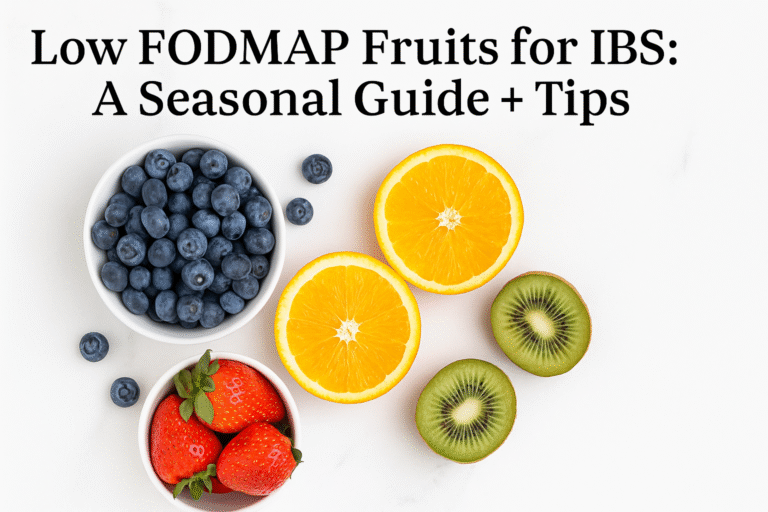If you suffer from Irritable Bowel Syndrome (IBS), you’ve likely been told to follow a low-FODMAP diet. But which fruits are safe—and which are likely to trigger bloating, cramps, or urgency?
Here’s your expert guide to the best low FODMAP fruits for IBS, complete with a handy list, portion tips, seasonal recommendations, and what to avoid.
What Are FODMAPs, and Why Do They Matter?
FODMAPs are short-chain carbohydrates that are poorly absorbed in the small intestine. They include:
- Fermentable
- Oligosaccharides
- Disaccharides
- Monosaccharides
- And Polyols
These compounds are found in a variety of foods, especially fruits, and they can trigger IBS symptoms like gas, bloating, diarrhea, or constipation.
Top Low-FODMAP Fruits for IBS
Here are fruits you can enjoy confidently while following a low-FODMAP diet:
1. Bananas (Unripe)
✅ Safe in moderation
🧠 Best consumed when slightly green—ripe bananas become higher in FODMAPs.
2. Blueberries
✅ Low-FODMAP at 40 blueberries (1 serving)
💡 Rich in antioxidants and great for gut inflammation.
3. Strawberries
✅ Safe at 10 medium berries per serve
🥣 Perfect for smoothies, oatmeal, or low-FODMAP desserts.
4. Kiwi
✅ 1 medium fruit per serving
🚽 Helps with IBS-related constipation due to natural enzymes like actinidin.
5. Oranges
✅ 1 medium orange is low-FODMAP
🍊 Vitamin C–rich and hydration-boosting.
6. Pineapple
✅ Safe at 1 cup chopped
💥 Contains bromelain, an enzyme that aids digestion.
7. Cantaloupe (Rockmelon)
✅ 1/2 cup is low-FODMAP
🌿 Mild and easy to digest, ideal for hot days or post-workout snacks.
High-FODMAP Fruits to Avoid with IBS
| Fruit | Reason to Avoid |
|---|---|
| Apples | High in sorbitol and fructose |
| Mangoes | Extremely high in fructose |
| Watermelon | Contains excess fructose and polyols |
| Cherries | Rich in sorbitol and fermentable sugars |
| Pears | High in polyols (sorbitol) |
| Plums/Prunes | Packed with sorbitol and fermentable carbs |
Even small portions of these high-FODMAP fruits can trigger gut symptoms in sensitive individuals.
How to Eat Low-FODMAP Fruits for IBS Safely
✅ Stick to Recommended Portions
Even safe fruits can cause problems if you eat too much.
✅ Pair Fruits with Protein or Healthy Fat
This slows digestion and balances blood sugar, easing gut workload.
✅ Track with a Food Diary
IBS is highly individual. Logging your reactions can reveal which low FODMAP fruits for IBS work best for you.
✅ Space Out Servings
Avoid combining multiple fruits at once to minimize FODMAP stacking.
Seasonal Low-FODMAP Fruit Guide (U.S.)
| Season | Low-FODMAP Fruit Choices |
|---|---|
| Spring | Strawberries, Kiwi |
| Summer | Blueberries, Pineapple, Cantaloupe |
| Fall | Unripe Bananas, Oranges |
| Winter | Kiwi, Oranges |
Buying in-season improves taste and nutrient content—great for gut health and budget-friendly too.
Expert Tips from Dietitians
- Use apps like Monash or Spoonful to check food FODMAP levels in real-time.
- Try blending low-FODMAP fruits into smoothies with lactose-free yogurt or chia seeds.
- Freeze fruits like blueberries or kiwi chunks for gut-friendly dessert options.
FAQ: Low FODMAP Fruits for IBS
Q: Can I eat dried fruits on a low-FODMAP diet?
A: Most dried fruits are high-FODMAP. Avoid raisins, dates, and dried apples.
Q: Is fruit juice IBS-friendly?
A: Juice concentrates FODMAPs. Either avoid or dilute heavily with water.
Q: What’s the best fruit for IBS-C (constipation)?
A: Kiwi and oranges have shown promise in improving motility naturally.
Final Thoughts: Enjoy Fruit Without IBS Flare-Ups
You don’t need to give up fruit to manage your gut health. By choosing the right low FODMAP fruits for IBS, you can enjoy delicious, fiber-rich, and nutrient-packed snacks without the painful consequences.
Stick to moderate portions, monitor your symptoms, and rotate your fruits for maximum digestive comfort.
Related Reads:
-
Ginger Tea for IBS: Benefits, Side Effects & How to Use It Right
-
IBS-Friendly Drinks & Hydration Tips for Gut Health
- How to Create a Weekly Low-FODMAP Meal Plan


4 thoughts on “Best Low FODMAP Fruits for IBS: What to Eat & Avoid”